- Home
- Anne Hampson
South of Capricorn Page 5
South of Capricorn Read online
Page 5
‘You heard aright, Mr. Farrell.’ Her voice was still steady, but her heartbeats were not. Also, she was aware of a vague uneasiness because this man’s manner and appearance were so very different from what she had expected. His eyes, though cold and hard, held an honest expression; his mouth was fuller and more generous than she had imagined, although there was a certain ruthlessness about it, and a firmness that spelt inflexibility. His whole bearing, though arrogant and confident, was impressive in that it gave a picture of integrity and lofty ideals. He was a man sure of himself, a man with the ability to command. He was a person whom anyone, even at first glance, would not hesitate to pronounce as a man to be trusted, a man upright and conscientious. Most certainly he would never be stamped as a man who had shirked his responsibilities, who had carelessly tossed aside his moral obligations. Yet all this would appear to be contradictory, Gail reminded herself, since he was the father of Leta, the child he had abandoned, a child whom he knew existed but did not care how she existed — or how her mother existed either. And he so wealthy a man. Why, no matter how much he had sent to Sandra he would never have missed it!
Turning to Leta, Gail once again told her to say hello to her father, but before she could do so she—like Gail—heard the amused titters coming from the stockmen, some of whom had actually dismounted and drawn nearer so as not to miss anything of this free entertainment. Leta turned and glared and Gail’s heart missed a beat. Leta hated to be laughed at; it riled her and she would always reveal the worst side of her nature should this happen. Gail—and indeed everyone who knew her—guarded against annoying the child in this way. But these men, totally unconscious of what they were doing, continued to titter, and in fact one man, noting that Leta’s cheeks were turning bright red, as well as swelling up, started to laugh in earnest.
‘You’re laughing at me!’ she seethed. ‘Yes, you are! I hate you!’ and before he could make a guess at her intention she had taken a brooch from her scarf and thrust the pin into his leg.
‘Hell!’ he exclaimed. ‘You little brat!’
‘I’ll do it again—and again!’ And she did, until, amid the laughter of his fellows, the man escaped by running away. Like a little wildcat Leta turned on another and gave him similar treatment.
‘I’m afraid,’ said Gail, looking up at Kane Farrell, ‘that your daughter is not very well behaved. In fact—’ She was interrupted by a lift of Kane Farrell’s hand, but whatever he was about to say was silenced by Leta, who shouted,
‘That’s right, I’m not well behaved! I’m the worst little girl in the whole world! I hate people, you see, and so I like making them angry! I’d like to kill all these men for laughing at me!’ She would have continued, but Kane Farrell was speaking, ordering the men to remove themselves. This they did, galloping away over the plain. Dave, uncertain and obviously just about as uncomfortable as he could be, explained about the rouseabouts, but Kane interrupted to inform him that he had received a message over the air. One man had met with an accident and was in hospital; the other would not come without him.
‘I wondered if you would hear from them,’ Dave said. ‘I had the empty car, and this young lady wanted to come here, so—’
‘That’s all right—very sensible.’ Kane Farrell’s face was impassive, his tone completely untroubled. Dave, noting this, seemed to breathe a sigh of relief—but at the same time was amazed that his boss was remaining so calm in this present situation. ‘Please leave us, Dave.’
‘Yes, Boss,’ and without a glance either for Gail or Leta, Dave strode briskly away towards the path along which he had come.
‘And now,’ drawled Kane Farrell evenly, ‘perhaps you will explain?’ His face was an impenetrable mask, but Gail had the impression that his mind was working at top speed.
‘Your daughter,’ began Gail, when she was interrupted, this time by Leta herself. The child had drawn so close to her and Kane Farrell that she was at his feet.
And like a miracle her whole manner underwent a change. Her mouth curved in a smile, her face was bright—animated, almost—and her beautiful eyes shone up at her father. Gail stared, open-mouthed, absorbing the fact that the child very much liked what she saw,
‘Hello, Daddy!’ she exclaimed. ‘I’ve come to live with you because I can’t live with Mummy any more. She’s gone to heaven and ...’ The bright excited voice trailed away as Leta turned to Gail, a question in her eyes, her forehead wrinkled as if she were struggling mentally. ‘What else did you tell me to say? I can’t remember—but I’m still having my books and chocolates and dolls’ clothes, remember!’ A threatening finger was wagged at Gail and Kane Farrell’s eyes narrowed ominously. However, it was not anger Gail detected in his expression ... no, it was something very strange indeed. He seemed to be deep in thought, as if a plan of action had formulated in his brain. ‘If you don’t give me all the things you promised I’ll kick and scream and pull your hair out!’ Leta was continuing in a loud voice. ‘It isn’t my fault that I’ve forgotten some of the things you said I must say to my daddy!’
Gail had naturally coloured vividly at this. Kane Farrell’s eyes were for a second tinged with amusement, but that something else still remained. How cool he was! It amazed Gail that, confronted like this with the child he had deserted, he could remain so unruffled. It was almost as if this sort of thing was an everyday occurrence with him, she thought, having an inexplicable desire to laugh—hysterically.
‘I d-did mention that her name was Leta?’ she stammered, and only then did she remember that he knew his daughter’s name anyway, from the letters Sandra had sent him. ‘Sandra, when she wrote to you all that time ago, would have told you everything about her ...’ She stopped, realizing she was speaking just for the sake of it, to relieve the tension that had taken possession of her. Her voice had a cracked quality about it which seemed to be affording her listener some amusement. Yet when he spoke it was absently, and his eyes seemed to be staring into the past.
‘All that time ago...’ he was murmuring at last, repeating some of Gail’s words and allowing his eyes to wander down to the child who, still at his feet, was staring up at him with a smile on her lips. He continued to stare at her with an intentness that revealed nothing to Gail. ‘Yes, all that time ago.’
‘Oh,’ intervened Leta brightly, ‘I’ve just remembered some more that you told me to say to my daddy—’
‘Never mind,’ broke in Gail, glaring at her. ‘You can now be quiet while I talk to your daddy.’
But another silence followed, with Kane Farrell’s face a study—unfathomable yet disturbing. His mind was on Leta, no doubt of that. What was he thinking about her behaviour? Strangely, he seemed not to be too perturbed by it, observed Gail, once again feeling that he had in mind some plan, a plan of which Leta was a part. He transferred his attention to Gail, saying quietly,
‘I’m waiting for your explanation, Miss...?’ A brow was raised inquiringly as he waited for her to answer his unspoken question.
‘Stafford,’ she replied briefly, and noticed his slight start of surprise.
‘The same name as Sandra. Some relation?’
‘Cousin.’ She paused a moment, aware of the fact that she had fully expected him to deny that he was the father of Leta. ‘You’re obviously intending to admit that this little girl is yours?’ she added, speaking her thoughts aloud.
Kane Farrell’s sudden smile was ironic. He deliberately allowed her question to go by unanswered.
‘Please say what you have to say, Miss Stafford.’ His horse was a little distance away, cropping grass, and Leta was now interestedly watching it.
Gail explained as briefly as possible, making no effort to keep the contempt from her voice. This could not escape him and several times his eyes glinted with anger. He appeared dangerous and Gail had to give herself an impatient shake on finding herself affected by an access of trepidation.
‘So her mother died three weeks ago?’ Kane Farrell’s eyes hardened to points of steel. Ga
il stared, bewildered by his manner. Yet he was apparently puzzled about something, for he shook his head from side to side, for the moment seeming to have forgotten her presence altogether. ‘And she made you promise to bring this child to her father?’
‘Yes, that’s what I’ve said. She left sufficient money for the journey—it was a legacy she received from our aunt. But even had she not left money I would have brought Leta to you.’ She paused a second, but he made no attempt to speak and she continued, ‘She’s had a dreadful time, Mr. Farrell, trying to bring up this little girl. It wasn’t only the keeping of her, but the managing of her. Poor Sandra was utterly worn out—’
‘There you go again!’ cut in Leta, red in the face with anger. ‘Everybody says I’m naughty and wicked!’
‘Which of course is correct,’ commented Kane Farrell mildly. ‘You must learn to control your temper, my child.’
Leta put out her tongue, but then she smiled at him, and her whole expression changed. She looked positively attractive, and even cuddlesome.
‘You’ll have to be very firm with her,’ Gail was recommending. ‘Perhaps a man can do something with her—’ She spread her hands in a little helpless gesture. ‘I don’t know — I really do not know!’ A tinge of despair edged her voice and he turned to her with interest. She flushed, much to her annoyance. But this man from the Outback, this bronzed and toughened cattleman whose very appearance spoke of the great outdoors, overwhelmed her with his dominant personality, his lofty confidence, his air of superiority. She resented this attitude of his and in consequence allowed her contempt to be revealed in her expression. It was defensive, but his eyes glinted and she saw his fist close, slowly and menacingly. A quiver of awe passed through her and she wished she had seen the end of this interview and was safely aboard the Overlander and on her way home.
‘Her mother could have done something, surely?’ he said frowningly.
‘She tried, but Leta became unmanageable. It might be of interest to you, Mr. Farrell, to know that, in the end, my cousin lost the will to live.’
His frown deepened.
‘How old was she?’ he inquired, and it did seem that a look of pain fleetingly crossed the tough but handsome face.
‘How old?’ Gail stared at him scathingly. ‘You should know! She must have told you how old she was! When she died she was not quite twenty-three!’
His dark brows contracted.
‘Be careful,’ he warned in a cold and measured tone. ‘People don’t usually speak to me in that manner.’
She lowered her head, annoyed with herself that she should be intimidated by so quiet a voice. But Kane Farrell was so disconcerting, his very lack of emotion set her off balance. She had expected an angry out burst, and an attempted denial that the child was his. Instead she had met this air of calm, adopted without the slightest effort after that first astounded exclamation on suddenly being brought face to face with his daughter.
Gail spoke, unable to bear the silence any longer.
‘If there are any more questions you wish to ask, Mr. Farrell,’ she said in stiff and formal tones, ‘then please do so. If not, perhaps you will tell me how I’m to get back to the railway station?’
Did his mouth curve slightly? His expression was strange, but certainly not amused. Nevertheless, Gail did suspect that his lips had twitched and that, inwardly, he had found something at which to smile.
‘I have many questions to ask,’ he told her calmly. ‘But I feel they will all be answered if you relate the story to me right from the beginning.’
‘The beginning?’ she frowned. ‘I don’t know what you mean.’
He moved, turning his head in the direction of the low hills which spread away in the far distance. The sun was lowering quickly and its slanting rays threw shadows as they pierced the thin layer of cloud which had gathered suddenly. Kane Farrell’s face, shaded by the broad brim of his hat, was no longer visible to Gail. She knew for sure that this hiding of it from her was deliberate. Why should he not wish her to see his expression?
‘My—er—association with Sandra Stafford. You weren’t there at the time—’
‘I was abroad, working,’ she interrupted. ‘You know very well I wasn’t there at the time, for if I had been you and I would have recognized one another.’ She felt a prickling sensation in the region of her spine, a sensation that warned ... or was it telling her that something was not quite right about this situation? Gail decided it was a little of both.
‘Yes,’ he murmured almost to himself, ‘we would have recognized one another.’ A pause; he kept his face away from her. ‘Did Sandra say we were married?’
‘She did, yes.’
‘I have the impression that you didn’t believe her?’
‘None of us believed her.’
‘None of you?’ He half-turned and, she saw him in profile.
‘My parents, and Sandra’s friend—a girl who helped her a great deal, both financially and in any other way she could.’
He seemed to give a small regretful sigh, but she could not be sure about this. However, it caused her to speak impulsively, asking if he were feeling some degree of remorse. At this he turned sharply, dark anger in his gaze. But whatever he had been going to say was bitten back and instead she heard the one brief word,
‘Perhaps.’
Her mouth curved with contempt.
‘A little late, don’t you think?’ with undisguised sarcasm. ‘Had you known qualms sooner then Sandra wouldn’t be where she is now.’ Strong words, and she was not at all surprised to see the angry colour creep along the sides of his jaw. However, once again he held his tongue ... and once again Gail experienced that feeling that he was planning something. She thrust it away, mainly because she could not be sure the impression was not bom of her imagination. She asked outright if he had married her cousin. No answer was forthcoming; instead, Kane Farrell put a few more questions to her, questions which she answered, but at the same time reminding him that he already knew the answers.
‘You were there! You’re the one involved, so I fail to see why you should want me to tell you about Sandra, and the date when Leta was born and all the rest. She wrote telling you about Leta, and I expect she asked you to send her money?’
Was it imagination, she wondered, or had his eyes suddenly taken on an expression of regret?
‘Yes, she did ask me for money,’ he said, almost inaudibly. And he added, in no more than a whisper now, ‘I should have sent her some ... yes, I should—’ He stopped, aware that he had a listener. Gail saw at once that he had been speaking to himself. She said involuntarily,
‘I can’t believe—somehow—that you’re such a cad as I first branded you.’
His swift smile was sardonic.
‘I’m flattered,’ he said crisply, and then he added, ‘You’re outspoken if nothing else, Miss Stafford.’ ‘Naturally we’ve all branded you a cad!’
He glanced to where Leta was sitting, on a fallen tree trunk which was lying not far from where his horse was cropping the grass.
‘In every situation,’ he said slowly, ‘there are parts unknown.’ He looked seriously at her. ‘I make a point of never condemning unless I have proof that condemnation is deserved. I want to ask you, Miss Stafford, to remember this.’
She lowered her lashes, acutely conscious of a rebuke.
‘You’ve shirked your duty; you’ll own to that?’
He allowed that to pass and said,
‘You asked just now if I was married to your cousin. You obviously sorted out her papers after she had died?’
Gail’s eyes widened. It was just as if he were pumping her—subtly asking if she had found a marriage certificate! If he were married to Sandra, then there most certainly would have been a marriage certificate in existence. He must know this. Puzzled in the extreme, and acutely conscious of that tingling sensation which seemed to warn that something was not quite right, she asked herself why Kane Farrell was so cautiously avoiding a direct answer.
He knew whether or not he had been married to Leta’s mother. Of course he knew ... and yet he appeared to be probing to discover whether or not any proof of a marriage existed. Gail shook her head bewilderedly, and stared at him with a questioning gaze.
‘I didn’t find a marriage certificate,’ she said, and then, ‘Mr. Farrell, were you married to Sandra?’ Surely he could not continue to avoid answering her, thought Gail, and she was right. He was hesitating, but she saw by his expression that an answer would this time be forthcoming.
‘No ... I was not married to Leta’s mother…’
Silence except for the sudden whinnying of the horse and the following exclamation with which Leta responded to it. Gail was still staring up into Kane Farrell’s dark countenance, her mind going over what he had just said. There had been the hesitation, and the rather odd inflection in his tone, and it was his tone rather than the words themselves which puzzled her. Also puzzling to her was her own state of mind, for one moment she was condemning him while the next she was telling herself that he could not be so heartless as it appeared on the surface.
‘Parts unknown ...’ So grave the voice, and a warning in the slate-grey eyes. What did he mean? Had there been some excuse for his conduct? But no. Gail would not have it. He had received Sandra’s letter; he had admitted this, and he had also admitted that he should have sent her money.
‘You’re a strange man,’ she sighed, not to him, but merely murmuring her thoughts aloud. ‘I wish I understood.’
No response from Kane Farrell; his brow was furrowed and even yet again she had the impression that he had some plan in mind.
‘Tell me,’ he said at length, ‘why was there no one who would take the child?’
‘Because I’m so naughty!’ from Leta who had risen and come towards him. ‘I’m bad, very bad! Mrs. Renshawe down our lane said I was the devil’s she-cub —’ She broke off, frowning. ‘What’s a cub? I thought it was a little baby lion.’ She looked up at him. ‘If it is then I’m not a cub, am I?’ she added, diverted to such an extent that the expression in her eyes was one of wonderment—rather an attractive expression, thought Gail, recalling how at times her expression could be so vicious that she looked almost ugly.

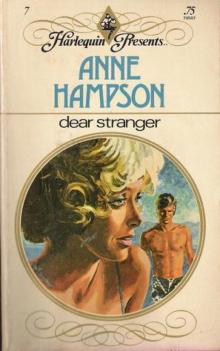 Dear Stranger
Dear Stranger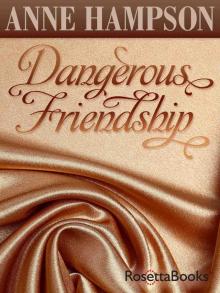 Dangerous Friendship
Dangerous Friendship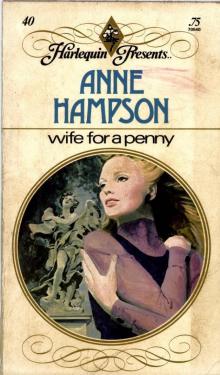 Wife for a Penny
Wife for a Penny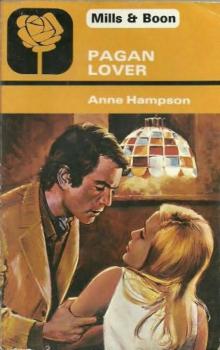 Pagan Lover
Pagan Lover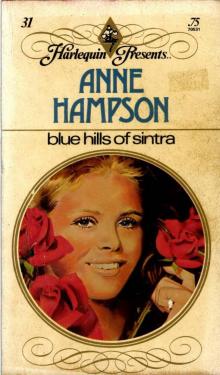 Blue Hills of Sintra
Blue Hills of Sintra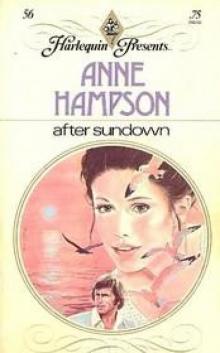 After Sundown
After Sundown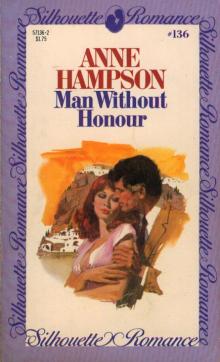 Man Without Honour
Man Without Honour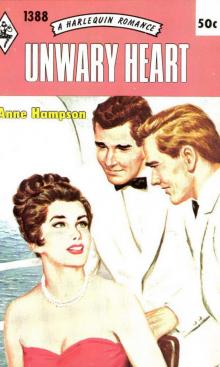 Unwary Heart
Unwary Heart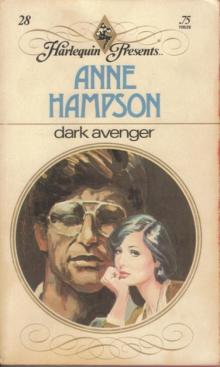 Dark Avenger
Dark Avenger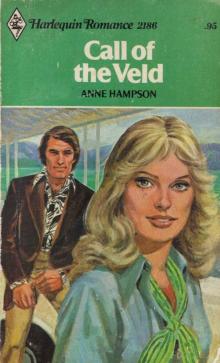 Anne Hampson - Call of The Veld
Anne Hampson - Call of The Veld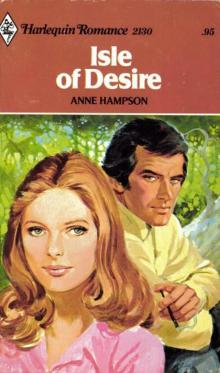 Isle of Desire
Isle of Desire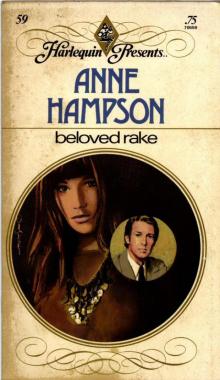 Beloved Rake
Beloved Rake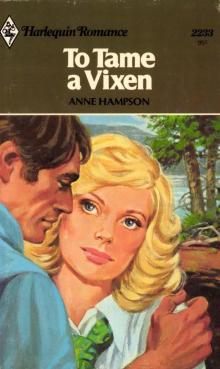 To Tame a Vixen
To Tame a Vixen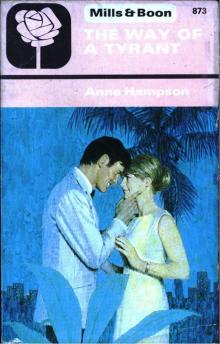 The Way of a Tyrant
The Way of a Tyrant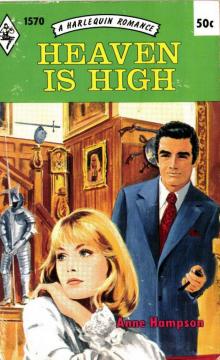 Heaven is High
Heaven is High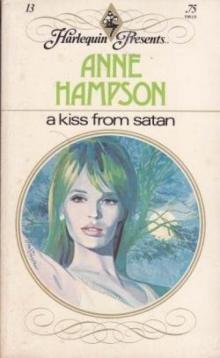 A Kiss From Satan
A Kiss From Satan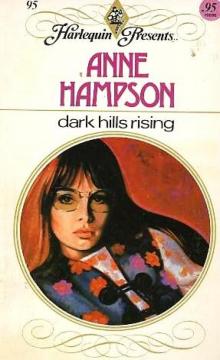 Dark Hills Rising
Dark Hills Rising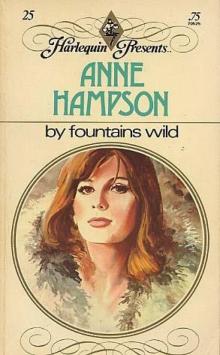 By Fountains Wild
By Fountains Wild Second Tomorrow
Second Tomorrow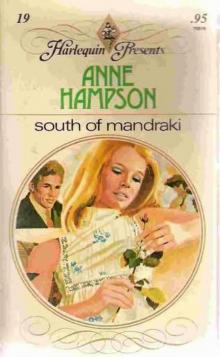 South of Mandraki
South of Mandraki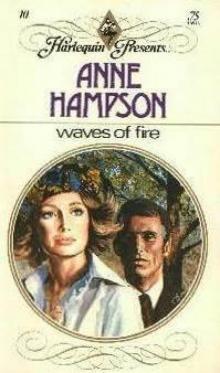 Waves of Fire
Waves of Fire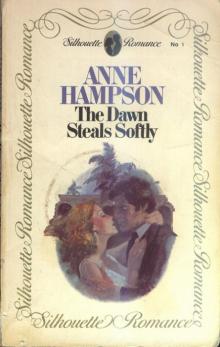 The Dawn Steals Softly
The Dawn Steals Softly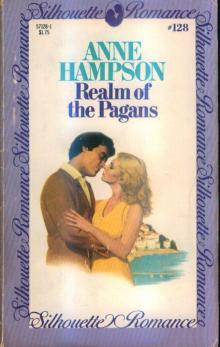 Realm of the Pagans
Realm of the Pagans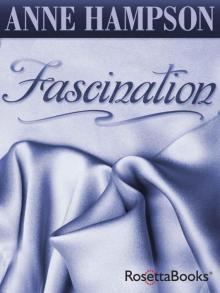 Fascination
Fascination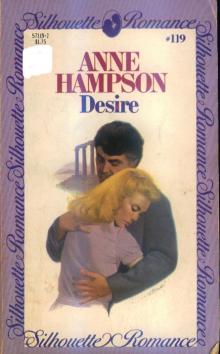 Desire
Desire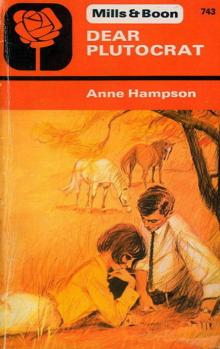 Dear Plutocrat
Dear Plutocrat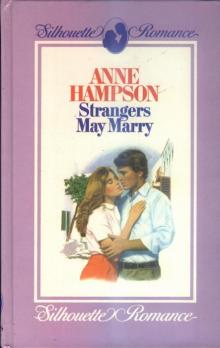 Strangers May Marry
Strangers May Marry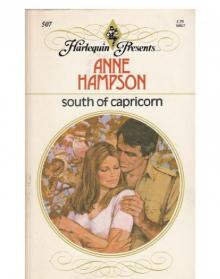 South of Capricorn
South of Capricorn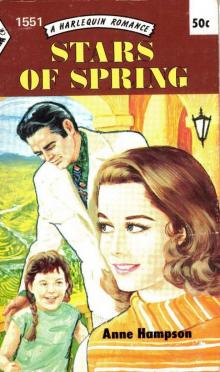 Stars of Spring
Stars of Spring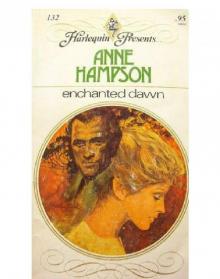 Enchanted Dawn
Enchanted Dawn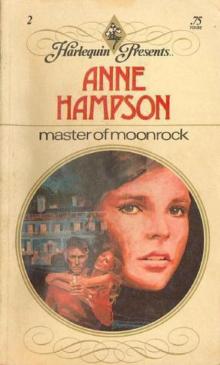 Master of Moonrock
Master of Moonrock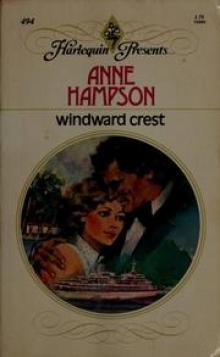 Windward Crest
Windward Crest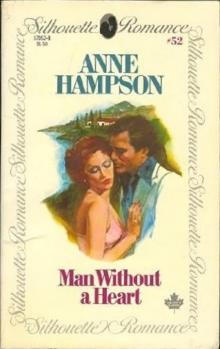 Man Without a Heart
Man Without a Heart